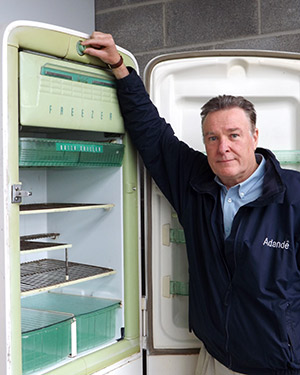Refrigeration needs innovation not duplication
5th November 2014 Ian Wood, co-founder and managing director of Adande, maintains that the industry needs a new approach to the development of cold storage solutions and challenges manufacturers to innovate, rather than duplicate existing technology.
Ian Wood, co-founder and managing director of Adande, maintains that the industry needs a new approach to the development of cold storage solutions and challenges manufacturers to innovate, rather than duplicate existing technology.
Every month, in the pages of industry trade magazines, I read manufacturers’ statements, claiming the introduction of “innovative” and “ground breaking” products and technology. I readily acknowledge that advances in compressor and evaporator technology, as well as the introduction of EC fans and electronic controllers, have improved efficiency and performance. There have also been developments in refrigerants used in the industry, but these have been largely dictated by regulation and legislation.
For three generations, the evolution of cold storage technology has, in the main, been component led, with the fundamental principles of refrigeration remaining unchanged. The result is that the majority of food service refrigeration equipment is of a similar design, sharing many of its characteristics with a domestic fridge from the 1940s.
Turning refrigeration through 90º
In a fairly short period, Adande has evolved from a HVAC engineering consultancy into a successful and respected manufacturer of refrigeration products for food service and food retailing. This has not been achieved by following industry custom and practice, but by challenging established wisdom on the design of refrigeration equipment. I’m not saying that we have turned refrigeration on its head, but we did rotate it through 90o, developing a system which is based on horizontal insulated drawers instead of conventional upright cabinets with doors.
The development of the Adande refrigerated drawer system was prompted by chefs working around the clock on North Sea oil and gas rigs. The kitchen fridges and freezers were in constant use, resulting in cold air spillage at each door opening and leading to food deterioration and wastage.
Our solution was a unique and subsequently patented drawer system, featuring a modified air flow pattern to deliver high efficiency cooling. The units eliminate warm air infiltration for energy savings of up to 60%, improve humidity and temperature stability with independent, like for like tests have indicated that food waste may be reduced by 25% by using our drawers.
Fresh approach
The inertia in our industry also applies to refrigerated display cabinets in the retail sector. The preferred solution for the display of chilled goods in supermarkets and convenience stores is the open front multi deck cabinet. Whilst these displays have benefited from component led enhancements over the years, the basic refrigeration characteristics of such cabinets have remained largely unchanged.
In the quest for more energy efficient refrigeration equipment, glass doors on open front cabinets were initially regarded by many manufacturers and retailers as the answer. However, evidence has indicated that glass doors act as physical barriers to shopping with a detrimental effect on browsing and impulse purchases.
In addressing a solution to the situation, we adopted a fresh approach to the principles of air flow and refrigeration, incorporating thermodynamic theory researched by Dr Ed Hammond of ECH Engineering and manufacturing input from The Bond Group.
After extensive development and testing we unveiled Aircell, which is a unique and patented air flow management system, designed to reduce energy consumption and improve the shopping experience, without the need for glass doors. Subsequently, we have worked closely with cabinet manufacturer, Manor Concepts, to produce prototype models, which have been trialled in the new Tesco eco store at Lincoln. In the coming months, Aircell will be available via several UK cabinet manufacturers, under licence agreements.
The demands from end users for energy efficient refrigeration equipment, with operational and performance benefits, have never offered more challenges to manufacturers than they do today. For those seeking to meet these challenges, I offer the following advice: the refrigeration industry needs innovation not duplication.







